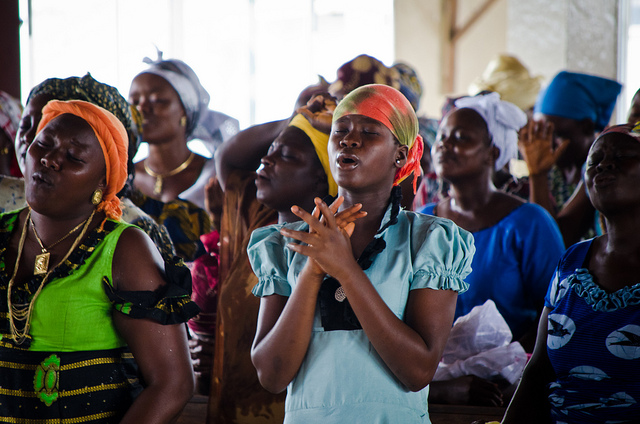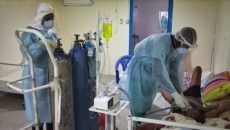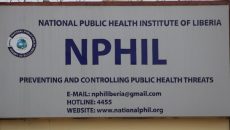MONROVIA, Montserrado – Across Liberia, churches and mosques have been back in session for weeks (albeit with a limit to 25 percent of their facilities’ capacities), as President George Weah bowed to pressure to reopen places of worship two months after they were first ordered closed.
Two days after reporting the country’s third COVID-19 positive case in March, the Ministry of Health declared a national health emergency, ordering that all places of worship, entertainment centers, bars, beaches, casinos, beauty salons, barbershops, and video clubs be closed.
That decision did not sit well with the largely religious Liberian public. Soon after the ban on worship centers was announced, a video recording trended on social media of Nimba’s Sen. Prince Johnson arguing with the police chief, who was attempting to stop the former warlord turned pastor from proceeding with his worship service.
One particular congregation that strongly resisted the government’s efforts to shut down worship centers was the Saints Assembly Ministry. Soon after the ban on such gatherings in March, the group held a large night vigil, which the police attempted and failed to disperse. The church regularly conducts mass weddings, and the health protocols announced by the government did not stop them from holding one a week later featuring 13 couples and over 300 attendees, with no social distancing adhered to.
In April, the Liberia National Police arrested nearly 500 of the church’s members in Margibi for disobeying health protocols put in place to stop the transmission of the virus. They had gathered there to celebrate Good Friday. The members argued that they needed to hold their services in order to pray for the country.
Pressure on the government to ease the ban on worship centers also came from Rep. Lawrence Morris of Montserrado’s first district, who gave radio interviews calling for the government to allow churches to reopen. On April 21, he said the government needed to re-open churches to allow the public to find solace during the difficult time.
For Morris, it made no sense to allow banks, supermarkets, and public transport services to continue operating, but not churches.
“There is no social distance in the market places and banks while vehicles are cramped with the same very law enforcement that we depend on,” he said. “We see this on a daily bases and it’s a mockery when you hear citizens asking questions because people are all mixed up together.”
Alieu Dolley, a resident of Paynesville, agrees with the representative: “You can’t leave market places that are always crowded open and have worship centers closed.”
It came as little surprise, then, when President Weah announced that mosques could open on May 15 and churches on May 17, although they were restricted to allowing only 25 percent of regular worshippers during each service. They were also directed to observe social distancing rules.
However, unexpectedly, most major groups of churches remained closed until the end of May, including the Catholic Church, Bethel Outreach Ministries, the United Methodist Church, and Providence Baptist Church. Smaller and unaffiliated churches generally all opened soon after the president’s announcement.
As for mosques, although the president’s easing of measures came just in time to allow the celebration of the end of Ramadan, the Daily Observer reported that the two most senior Muslim leaders, Chief Imam Sheikh Ali Krayee and Grand Mufti Sheikh Abubakar Sumaworo, disagreed over whether mosques should open. Sumaworo argued that mosques should remain closed if they were initially closed to prevent a spread of COVID-19, especially since cases continued to rise. Krayee, on the other hand, thought if mosques could ensure social distancing and follow other health protocols, they should be allowed to open.
Across Montserrado, many residents also balked at the president’s decision to relax the ban on worship centers. The former executive director of the Liberia Media Center, Lamii Kpargoi, thought a small jump in cases weeks after the president’s announcement was concerning, but he reserved judgement.
“I was looking at the Coronavirus updates from [the National Public Health Institute of Liberia] over Sunday, May 10 to Saturday, May 26, and realized that there seems to be a serious uptake in infections for this two-week period,” he said in an interview in late May.
“Over the week of Sunday, May 10 – Saturday, May 16, the total number of new cases reported was 15. For the work of Sunday, May 17 – Saturday, May 26, the total number of new cases reported is 36. The new infections clearly more than doubled in just one week.”
He said it was too early to arrive at a conclusion, “but what is clear is that the strategies that are currently in place to contain the situation do not seem to be working.”
Paynesville resident John Blamo said the hasty reopening of worship centers risked the health and safety of citizens and could allow for more transmissions.
“It is already difficult to make them abide by the measures put in place by our health authorities, and now we will be gathering for service. This is really unexpected of any government that loves [the] country and its people,” he said not long after the announcement was made.
Blamo believed that the government’s action, while cases were increasing, could help promote doubt and disbelief among the population about whether COVID-19 was real.
“COVID-19 is real and [the] government needs to make her citizens believed [that] it’s real,” he said. “We all saw what happened to us during the Ebola crisis.”
Women and children’s rights advocate Titus Pakalah agreed, describing the president’s decision as a mockery that was undermining religious peace and security.
A student at the United Methodist University, Fatima F. Bility, also said she was disappointed that worship centers were allowed to reopen. She said it made little sense, especially when schools and all public gatherings were closed with only three confirmed cases.
“The action of the government only points to the fact that either there’s no virus in the country or the government wants more people affected with the virus,” Bility said.
She noted that because of the doubts created, during the celebration of Eid al-Fitr, at the end of Ramadan, she did not see many people following the preventive measures put in place by health authorities.
While most people worried about the mixed messages being sent by the government, Vickjune Wutoh, a student leader, said she respected the decision of the president and believed that he did so based on calls from religious leaders.
“I know the president’s action was in consultation with health authorities, religious leaders, and his advisor,” she said, adding that the best thing to do now is to observe the measures and carry out more awareness.
Wutoh asked that the president listens more and acts fast in the interest of the people.
An Islamic scholar and former candidate for Montserrado’s senatorial by-election, Mohammed Dukuly, also said the president did nothing wrong in reopening worship centers. However, he said the government needed to do more monitoring to ensure that people were compliant with health protocols.
He warned that banning worship would not help when market places are open, unrestricted. He urged for more involvement of the community in the fight against the virus.
“They will be responsible to make sure that the 25 percent of worshipers are in each session and the wearing of masks and the use of thermometers to check the temperature of members will add gain to [the] government’s effort,” he added.
Right now, Dukuly said, people do not see themselves as part of the process.
Meanwhile, Liberia now has 498 new cases, with 40 new cases reported on June 14, the highest in one day. These cases are being recorded even as measures put in place to curtail the spread of the diseases are being significantly eased, causing a disconnect in messaging. Many Liberians see the pandemic as improving as restrictions on their lives are being lifted, but the increasing number of cases tells a different story.
Featured photo by Ken Harper



